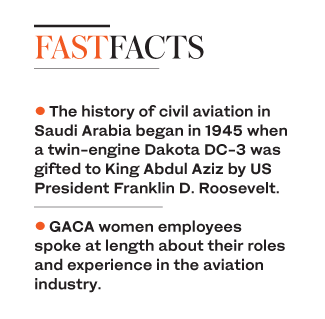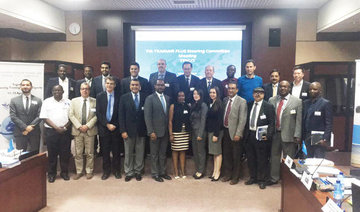RIYADH: The General Authority of Civil Aviation (GACA) hosted the opening of the 2019 Global Aviation Summit (GAS), a two-day international forum, at the Ritz-Carlton hotel in Riyadh on Monday.
In his opening address, Saudi Minister of Transport Dr. Nabeel Al-Amoudi discussed the value of the industry to the Kingdom, stating that civil aviation generated an estimated $126 billion annually, as well as providing 527,000 jobs.
He also discussed the recent accidents involving two Boeing 737 MAX aircraft, saying there were no immediate plans to allow the model to operate in Saudi airspace. “There were no 737 MAX aircraft flying in the Kingdom at the time,” he said, “and there aren’t plans for them to fly again in the near future.” Boeing’s top-selling MAX jet was grounded globally last month after two fatal crashes in Indonesia and Ethiopia.
Boeing’s senior managing director for commercial marketing, Darren Hulst, gave a keynote address where he discussed the Kingdom’s peculiarly opportune position in the global aviation industry.
“Saudi Arabia is unique, both as a strategic location and a destination, through pilgrimage and the Hajj and Umrah sector, and growing tourism opportunities,” he said.
“There is also the whole economic industry that comes along with aviation. Boeing has been a part of building that industry he re in the last few decades, with various partnerships and joint ventures, and we are continuing to accelerate those investments.”
re in the last few decades, with various partnerships and joint ventures, and we are continuing to accelerate those investments.”
The history of civil aviation in Saudi Arabia effectively began in 1945, when a twin-engine Dakota DC-3 was gifted to King Abdul Aziz by US President Franklin D. Roosevelt. It was the first aircraft to land in the Kingdom, and it marked the beginning of Boeing’s relationship with the country.
“When we think about where we are today and where we can be as an industry in the next decade, the opportunities are limitless,” Hulst continued. “When you take into consideration the number of airplanes to support, the number of people to train, and the value of goods and services produced, we think this country has a unique advantage. In general, aviation growth has always doubled in relation to economic growth. Here in Saudi Arabia, though, because of all of its advantages, we see a fourfold multiplier effect. Boeing looks forward to being a part of it.”
The GACA’s media spokesman, Ibrahim Al-Rosa, said: “We are hosting over 150 high-profile individuals, including the heads of the world’s largest aviation companies. The GACA has long believed in the importance of this industry, its development and progress, which includes investment opportunities and the ushering in of a promising young generation of men and women.”
Female GACA employees also spoke at length about their roles and experience in the aviation industry. At the “Women in Aviation” panel discussion, Haifa Hamedaldean, transformation project manager for the Saudi Air Navigation Services (SANS), discussed the roles women now hold in aviation.
“I’m delighted to represent SANS as a vehicle for female empowerment in the aviation industry,” Hamedaldean said. “SANS not only attracts women in administrative roles, but also in operational ones. In little over a year, SANS has grown the number of women employed from zero to 38. You’ll find them in strategy, management, engineering and information technology. You’ll see them in human resources, in training and recruitment. Eleven of our women serve as air-traffic controllers and we are expecting 15 more to join us by the end of this year.”
As Saudi Arabia continues to diversify its economy, the civil aviation industry represents a key pillar in that change, given the country’s location as a global logistical hub. Investment deals proposed at the GAS could see thousands of jobs created, and would raise the Kingdom’s global ranking in the Logistics Performance Index from 49 to 25. Direct foreign investment, currently at 3.8 percent, would rise to 5.7 percent of the gross domestic product. At the GAS, a memorandum of understanding was signed between the Kingdom and Argentina on air transport cooperation, while agreements were also signed with Georgia and Chad, in addition to an air service agreement between the GACA and the Cypriot government.
2019 Global Aviation Summit opens in Riyadh
2019 Global Aviation Summit opens in Riyadh

- Civil aviation sector in the Kingdom generates an estimated $126 billion in revenues annually
- Investment deals proposed at the GAS could see thousands of jobs created, and would raise the Kingdom’s global ranking in the Logistics Performance Index from 49 to 25
KSrelief to host 4th Riyadh International Humanitarian Forum in February 2025

- Themed “Navigating the Future of Humanitarian Response,” the forum will coincide with KSrelief’s 10th anniversary
RIYADH: The King Salman Humanitarian Aid and Relief Centre will host the fourth Riyadh International Humanitarian Forum on Feb. 24-25 next year, under the patronage of King Salman, the Saudi Press Agency reported on Monday.
Themed “Navigating the Future of Humanitarian Response,” the forum will coincide with KSrelief’s 10th anniversary and is being organized in partnership with UN humanitarian agencies.
It will bring together global leaders, donors, humanitarian workers, and experts to address pressing challenges in humanitarian aid.
The event will also feature high-level panel discussions with renowned researchers and specialists from Saudi Arabia and around the world.
Topics will include the role of humanitarian diplomacy in mitigating conflicts and disasters, strategies for effective delivery of aid and relief supplies, and addressing displacement amid escalating conflicts and natural disasters, SPA added.
KSrelief, Saudi Arabia’s humanitarian arm, continues to play a pivotal role in addressing crises and supporting vulnerable communities worldwide, and the forum underscores its commitment to fostering dialogue and innovation in the humanitarian sector.
The previous edition of the forum in 2023 concluded with recommendations to minimize funding gaps in relief aid and leverage science and innovation for quicker response and improved coordination in humanitarian efforts.
Muslim World League chief meets Pope Francis in Vatican City

- During his visit to Italy, Al-Issa received an honorary fellowship in post-doctoral law studies from the University of Bologna
RIYADH: Dr. Mohammed bin Abdulkarim Al-Issa, secretary-general of the Muslim World League, met Pope Francis, the leader of the Catholic Church, in the Vatican to discuss mutual cooperation and shared interests.
During his visit to Italy, Al-Issa received an honorary fellowship in post-doctoral law studies from the University of Bologna.
The ceremony was attended by the university’s president, the law faculty’s dean, academics, and religious leaders from both Islamic and Catholic communities.
The honor recognized Al-Issa’s efforts in advancing the goals of the UN Charter, promoting peace, reducing cultural tensions, and fostering mutual understanding and collaboration among communities.
The MWL chief emphasized that the reasons for awarding him the post-doctoral fellowship in law from one of the most prestigious Western universities “reflect our Islamic values, which we must clarify to everyone.”
As part of his visit, Al-Issa launched the Islamic Studies and Arabic Language Award at the Catholic University of Milan.
The event was attended by high-level Vatican officials, marking the launch of a groundbreaking initiative to promote the teaching of the Arabic language and Islamic studies in Europe.
Islamic leaders described the award as a long-awaited step on an influential platform within Christian communities. The award includes categories that clarify Islamic concepts and promote the beauty and importance of the Arabic language.
Saudi wildlife center releases 66 endangered animals in King Khalid Royal Reserve

- 40 rhim gazelles, 10 Arabian oryx, 10 houbara bustards and 6 idmi gazelles released as part of wider initiative to enhance biodiversity and restore ecological balance
- Solar-powered tracking devices fitted to some of the animals to monitor patterns of movement, behaviors and how they adapt to their environment
RIYADH: The National Center for Wildlife has released 66 endangered native animals into the King Khalid Royal Reserve in Al-Thumamah region of northeastern Riyadh.
Forty rhim gazelles, 10 Arabian oryx, 10 houbara bustards and six idmi gazelles were released as part of a wider ongoing initiative, in partnership with the Imam Abdulaziz bin Mohammed Royal Reserve Development Authority, that aims to enhance biodiversity, restore ecological balance, promote sustainability, and support eco-tourism in the reserve, the Saudi Press Agency reported.
“This release is a significant step toward maintaining ecological systems and promoting biodiversity,” said Mohammed Qurban, the CEO of the wildlife center.
The stated aim of organization is to become a global leader in wildlife protection, by focusing on breeding endangered species and reintroducing them into natural ecosystems in line with international conservation standards.
Qurban said the center is dedicated to conducting research on endangered species and monitoring biodiversity in protected areas using advanced technologies that track animal populations and collect data that is critical in efforts to address conservation challenges and opportunities.
Talal Al-Harigi, CEO of the development authority, said solar-powered tracking devices have been fitted to some of the released animals. These will enable researchers to monitor them via satellite to gain valuable insights into their patterns of movement, behaviors and how they adapt to their environment.
The initiative also helps to support efforts to restore ecological balance and increase vegetation cover in the reserve, which essential to help species adapt to natural habitats, he added.
City governor launches $160m first phase of Madinah Gate project

- Development will comprise apartments, hotel, retail units, bus station
MADINAH: Madinah governor Prince Salman bin Sultan bin Abdulaziz on Monday launched the $160 million first phase of the Madinah Gate project.
The mixed-use development will comprise a 325-bedroom DoubleTree by Hilton hotel, 80 shops, 44 restaurants, apartments, recreational facilities and a bus station, the Saudi Press Agency reported.
It will also have a direct connection to the Haramain High-Speed Railway, which links Madinah with Makkah.
Madinah Gate — the first two phases of which will span 37,000 sq. meters — is being developed as a collaboration between Saudi Arabia Railways and developer Knowledge Economic City Co., with support from the city’s authorities.
Amin Shaker, chairman of the development company, said the project — its first in southern Madinah — would help strengthen the city’s status as a global visitor destination.
New partnership set to drive Kingdom’s architecture industry

- Deal will help promote local talent, foster innovation
RIYADH: The Architecture and Design Commission has signed a strategic partnership with contracting firm Nesma & Partners to promote the Kingdom’s architecture and design industry.
The commission’s CEO Sumayah Al-Solaiman and Nesma’s Managing Director Rami Al-Turki on Monday signed a memorandum of understanding to establish a framework for collaboration in professional development and industry innovation.
The partnership aims to prepare a new generation of Saudi professionals to compete on the world stage and reinforce the Kingdom’s position as a regional hub for architecture and design excellence.
“The initiative aims to empower architects and designers to develop their skills and enhance their capabilities, creating an environment that nurtures Saudi talent while fostering innovation and creativity in the sector,” Al-Solaiman said.
It would also help to advance the commission’s mission to forge strategic alliances with industry leaders, she said.
Under the deal, the two sides will cooperate in areas such as industry best practice, knowledge exchange and professional workshops. It will also involve the joint sponsorship of competitions, awards and conferences.
“As a leading Saudi contractor, we are committed to providing training and creating employment opportunities for Saudi architects,” Al-Turki said.
“Our strategic partnership with the commission reflects our values of innovation, excellence and social responsibility.”
The initiative aligns with Saudi Vision 2030’s goals for sector development, focusing on building a sustainable ecosystem for architecture and design professionals.
The commission emphasized its commitment to advancing scientific research and creating an integrated environment that supports the sector’s creative community.






















